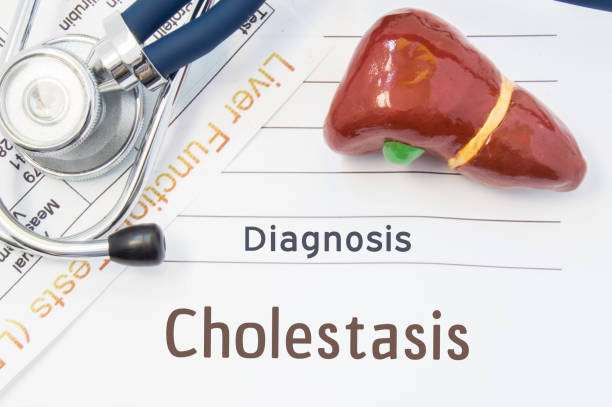Cholestasis of pregnancy
What is Cholestasis of pregnancy?
Cholestasis of pregnancy, commonly known as interaheptic Cholestasis of pregnancy(ICP), is a liver condition that disrupts the normal flow of blood during pregnancy. The illness typically affects women in their trimester, causing pain and significant threats to both women and the baby. In this article, we will look at the causes, symptoms, dangers, and treatment of cholestasis of pregnancy in order to throw light on the illness and give useful information to pregnant women.
Understnding Cholestasis of pregnancy:
Pregnancy cholestasis occurs when the normal flow of bile, a digestive fluid generated by the liver, is disrupted. Bile is required for fat digestion and absorption, and any disturbance in its flow might have serious effects. Hormonal changes during pregnancy can impair the liver’s capacity to transport bile, causing it to accumulate in the circulation. This bile salt accumulation causes the typical symptoms of pregnant cholestasis.
Symptoms of Cholestasis of pregnancy:
Recognizing the signs of pregnant cholestasis is critical for early identification and treatment. While the intensity and precise symptoms vary from person to person, the following are the most typical indicators:
Itching:
Persistent and strong itching, especially on the palms of the hands and soles of the feet, may be one of the first indicators of pregnant cholestasis. Itching generally gets worse at night and is accompanied by a rash.
Dark urine:
Urine may seem darker than usual, similar to the color of cola or tea. This is related to increased bile salt levels in the circulation. Urine production remains normal despite the darker hue.
Pale Stool:
Pregnancy cholestasis can result in light-colored or pale feces due to a decrease in bile flow into the intestines. Any substantial changes in bowel motions during pregnancy should be noted.
Fatigue:
Pregnant women with cholestasis may have generalized weariness and a sensation of continual exhaustion. The actual cause of this symptom is unknown, however it is thought to be connected to the liver’s reduced functioning.
Risks Related with Cholestasis of pregnancy:
While pregnant cholestasis can be painful and stressful for expecting moms, it also poses some hazards that must be considered. Healthcare practitioners and pregnant women must be aware of the following possible complications:
Premature birth:
Pregnancy cholestasis raises the risk of premature delivery, with some research indicating that the frequency of preterm labor is greater in afflicted persons than in the general population. Medical intervention may be necessary to treat and reduce the risk of premature delivery.
Fetal suffering:
Bile salts and other chemicals accumulated in the mother’s circulation might cross the placenta, possibly hurting the baby. Fetal discomfort, manifested by aberrant heart rate patterns, is a concern in pregnancy cholestasis. Throughout the pregnancy, continuous monitoring of the baby’s well-being may be required.
Stillbirth:
In rare cases, pregnant cholestasis might raise the chance of stillbirth. Although this danger is minor, it highlights the significance of thorough monitoring and continual communication between the healthcare professional and the pregnant woman.
Cholestasis of Pregnancy Issues:
Although this illness is uncommon, it can lead to serious problems if left untreated. From preterm deliveries to fetal discomfort, pregnancy cholestasis not only affects the pregnant woman but may also damage the fetus. You may be wondering what the symptoms of this disease are Itching that is severe, usually on the hands and feet, Urine color is dark, Lightweight stools.
Treatments for Cholestasis of pregnancy:
Proper pregnant cholestasis therapy is critical for lowering symptoms, limiting risks, and protecting the health of both the mother and the baby. The management strategy may differ based on the conditions, but popular options include:
Medications:
Several drugs might be used to treat the itching caused by pregnant cholestasis. Antihistamines, ursodeoxycholic acid, and bile acid sequestrants are examples of such medications. It is critical to follow the advice of your healthcare practitioner and take drugs as directed.
Regular checkups of liver function:
Regular checking of liver function tests, such as serum bile acid levels and liver enzymes, aids in determining the severity of the problem and guiding the treatment approach. Blood tests are generally done at regular intervals to track any changes and alter treatment as needed.
Fetal survelliance:
It is critical to continuously monitor the baby’s well-being with non-stress tests, ultrasounds, and biophysical profiles to detect any symptoms of fetal distress or potential issues. More regular monitoring may be required depending on the severity of the problem.
Early delivery:
To limit the chance of difficulties, the healthcare professional may consider inducing labor or arranging a cesarean section before the due date. This choice is often taken after taking into account a number of considerations, including the gestational age, the mother’s and baby’s overall health, and the severity of cholestasis.
Dealing with Pregnancy Cholestasis Issues:
The fact is that dealing with cholestasis during pregnancy may be stressful. However, worrying will not help. Here is a list of potential coping methods you might use:
- Maintain skin hydration
- Dress comfortably in cotton.
- Take a relaxing bath.
- Experiment with relaxing techniques such as deep breathing or yoga.
Conclusion:
Pregnancy cholestasis is a liver condition that can cause pain, increased risks, and potential consequences for both the mother and the child. It is critical for expecting moms to recognize the symptoms, understand the dangers connected with them, and engage in correct care. Individuals with cholestasis of pregnancy may traverse this difficult phase with greater confidence and secure the best possible results for themselves and their kids by collaborating with healthcare experts, regularly monitoring the condition, and following the recommended procedures.





